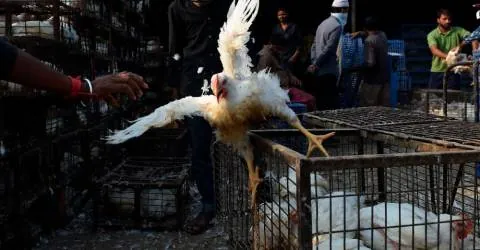
Urgent Action as Bird Flu Outbreak Hits England: What You Need to Know!
2024-12-24
Author: Nur
LONDON:
In a concerning development, bird farms along England's eastern coast are implementing strict preventative measures in response to a significant outbreak of bird flu. As of Monday, the UK’s Department for Environment, Food and Rural Affairs (DEFRA) confirmed several new cases of the virus, particularly in Norfolk and the East Riding of Yorkshire.
In a preemptive move to contain the spread, DEFRA reported plans to cull infected birds and establish a protective zone stretching three kilometers (about 1.8 miles) around affected farms. With cases being reported, bird keepers in this newly designated area—covering regions including Lincolnshire and Suffolk—are now required to keep their birds securely housed to minimize contact with potential vectors of the virus.
The current outbreak has seen the risk of bird flu in wild birds assessed as "very high" across Great Britain, suggesting that the likelihood of infection is almost certain. For poultry, the risk remains between "medium" and "high."
Since the onset of this outbreak in November, 11 cases of the highly pathogenic H5N1 strain and one case of the H5N5 strain have been confirmed in England. However, thankfully no cases have been reported in Scotland and Wales as of yet. Alarmingly, the World Organisation for Animal Health has stated that Great Britain is no longer considered free from highly pathogenic avian influenza (HPAI). The last reported cases prior to this surge were in February 2024.
This current crisis follows the largest avian influenza outbreak in the UK from 2021 to 2023, which was predominantly driven by the H5N1 strain. This outbreak devastated the avian population, leading to the culling of 3.8 million birds and significant declines in certain seabird populations, as noted in research conducted by conservationists earlier this year.
While the disease primarily impacts birds, the UK Health Security Agency (UKHSA) reassures the public that the risk to human health remains very low. Nonetheless, scientists are increasingly concerned about the virus's potential to mutate and spread among mammals, which could pose future risks.
With bird flu outbreaks on the rise, it is crucial for bird keepers and the general public to remain vigilant and informed. The situation underscores the importance of biosecurity measures in preventing further escalation of this animal health crisis. Stay tuned for updates as we monitor this developing story!



 Brasil (PT)
Brasil (PT)
 Canada (EN)
Canada (EN)
 Chile (ES)
Chile (ES)
 España (ES)
España (ES)
 France (FR)
France (FR)
 Hong Kong (EN)
Hong Kong (EN)
 Italia (IT)
Italia (IT)
 日本 (JA)
日本 (JA)
 Magyarország (HU)
Magyarország (HU)
 Norge (NO)
Norge (NO)
 Polska (PL)
Polska (PL)
 Schweiz (DE)
Schweiz (DE)
 Singapore (EN)
Singapore (EN)
 Sverige (SV)
Sverige (SV)
 Suomi (FI)
Suomi (FI)
 Türkiye (TR)
Türkiye (TR)